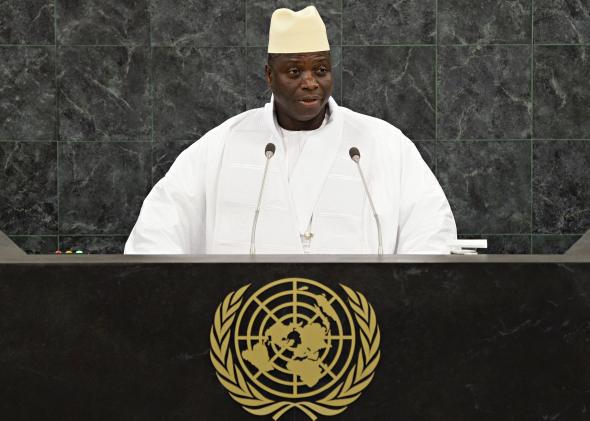Very few heads of state could get away with calling gay people ungodly vermin, but that’s what Gambia’s President Yahya Jammeh just did. And he didn’t stop there. In a public address on the country’s independence day last Tuesday, the leader of this tiny West African nation went so far to declare:
Homosexuality will never be tolerated and in fact will attract the ultimate penalty since it is intended to bring humanity to an inglorious extinction. We will fight these vermins called Homosexuals or gays the same way we are fighting malaria-causing mosquitoes; if not more aggressively. We will therefore not accept any friendship, aid or any other gesture that is conditional on accepting Homosexuals or L.G.B.T. as they are now baptised by the powers that promote them. As far as I am concerned, L.G.B.T can only stand for Leprosy, Gonorrhoea, Bacteria and Tuberculosis; all of which are detrimental to human existence.
Secretary of State John Kerry put out a statement in response, noting that he was “deeply troubled by the hateful rhetoric used by President Jammeh.” He called on the government in Banjul to protect the human rights of all Gambians, and he encouraged the international community to join in the condemnation of the president’s proclamation.
That is the wrong approach. Talk of human rights for LGBTQ Gambians isn’t going to help their situation. International condemnation won’t convince President Jammeh to change his mind. To prove that he isn’t fazed by threats to tie aid to LGBTQ rights, in 2012 President Jammeh declared that Gambians would rather eat grass than accept homosexuality in the country. That same year, he launched “Operation Bulldozer” to rid the country of drug dealers, pedophiles, murderers, and homosexuals, among other groups. International validation is not a priority for a president who claims he can cure AIDS.
Instead, Secretary Kerry needs to reach out directly to Gambians to try to turn the tide of public opinion. To do so, he should use an analogy that would resonate with Gambians, a people who once travelled to North America in shackles on slave ships. Kerry’s statement should say that not only does the United States find President Jammeh’s statement reprehensible, it also finds it unfortunate—because it displays the same inability to grow and mature that defined the United States throughout the era of slavery and Jim Crow.
Gambians understand slavery. Every year in Banjul, the capital, there is a festival to commemorate Roots, Alex Haley’s book and subsequent TV series, which traced the life of an African-American family that originated from a Gambian slave.
It is time to reinforce to Gambians that the same type of bigotry that allows President Jammeh to stoke the anti-LGBTQ fire caused their ancestors to pick cotton in the American South. Until they can appreciate that arguments justifying these measures in the name of an “African culture” are misplaced, they’ll never fully accept the idea that LGBTQ Gambians deserve equal rights.
Colonialism tarnished the West’s credibility to speak about rights and decency. The fact that Gambia and most other states that criminalize LGBTQ acts do so based on laws inherited from colonial powers is a fact conveniently overlooked by President Jammeh and others. Also ignored is the fact that homosexuality didn’t just appear like a rainbow after the Gambian rainy season. A Ugandan LGBTQ group fighting that country’s Anti-Homosexuality Bill—which President Yoweri Museveni has now signed into law—just released a report documenting homosexuality’s history in Africa, starting long before a single Brit stepped foot on the continent.
Still, for whatever reason, these arguments don’t resonate in places like Gambia. In the face of encroaching Western culture, they find themselves clinging to incorrect notions of African sexuality to fend off the onslaught.
Secretary Kerry’s statement was an important public reminder that the United States considers international LGBTQ rights worthy of U.S. attention. But if he really wants to make an impact, he needs to talk in a language Gambians, and other Africans, will want to understand. He needs to let Gambians hear that President Jammeh isn’t the first leader to call an unpopular minority ungodly vermin.
